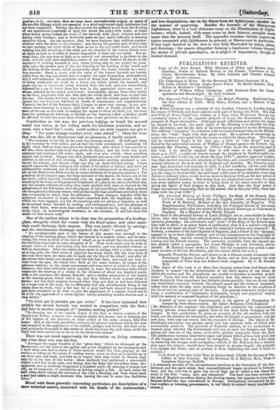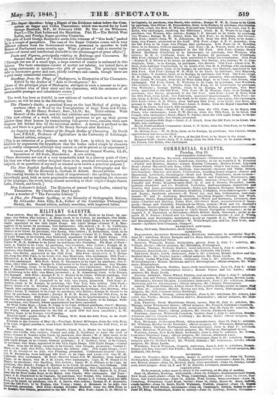PUBLICATIONS RECEIVED.
Lays of the Deer Forest. With Sketches of Olden and Modern Deer_ hunting; Traits of Natural History in the Forest; Traditions of ths Clans; Miscellaneous Notes. By John Sobieski and Charles Edward Stuart.. In two volumes.
The Pilgrimage to Rome. By the Reverend M Hobart Seymour, MA, The Latin Church during Anglo-Saxon Times. By Henry Soames, hLj Editor of Mosheim's "Institutes."
Memoir of William Riley Chcmning; with Extracts from his Cone spondence and Manuscripts. In three volumes.
The Rise and Fall of Rome Papal. By Robert Fleming. Reprinted frora the first edition in 1701. With Notes, Preface, and a Memoir of the Author.
[Mr. Robert Fleming was a minister of the Scottish Church in London during the reigns of William and Anne and the early part of George the First. His Rise and Fall of Rome Papal was written at a time when Protestant Europe was reasonably alarmed at the gigantic projects of Louis the Fourteenth, and ths prospect of Papal domination. Although moral reflections and advice are mined up largely in his book, the main object of Mr. Fleming is to identify the Pepe with Antichrist, and fix the date of his downfall as predicted in the Revelations. The different " trumpets" he conceives refer to occurrences previous to the Reform. ation; the " vials" begin with that great event. By a system of chronology Ix makes the dates correspond with the events to which he likens them. The fourth vial he conceived began in his own age; a blow to "the Beast" was in- flicted by the substantial success of William of Orange against the French; bat, continues Mr. Fleming, writing in 1700—" First as to the remaining part of this vial, I do humbly suppose that it will come. to its highest pitch about a. D. 1717, [confirmed closely enough for prophecy by Marlborough's vie- tories,] and that it will run out about the year 1794"-: another apparent verifica- tion that excited considerable attention at the time, and canoed the circulation of several editions of the book both in England and America. Mr. Fleming consi- ders that Antichrist will continue to exist, in a low condition, till the year 2000, but willreceive the death-stroke in 1848. " If we may suppose that Antichrist be- gan his reign in the year 606, the additional 1,260 years of his duration, were they Julian or ordinary years, would lead us down to the year 1866, as the last period of the seven-headed monster. But seeing they are prophetical years only, we must cast away eighteen years, in order to bring them to the exact measure of time which the Spirit of God designs in this book. And thus the final period of Papal murpations (supposing that he did indeed rise in the year 606) must vill- ein& with the year 1848."] The Personal History of Louis Philippe, Ex-King of the French, from 1773 to 1848. Comprising the only English edition yet published of the Work of N. Boutmy, Member of the late Chamber of Deputies. With Supplementary Particulars, including the Principal Events Of the recent Revolution until after the arrival of the deposed Sovereign at Claremont in England. By a Member of the Middle Temple.
[The facts in the personal history of Louis Philippe are so remarkable in them- selves, that they would have attracted public attention in the case of a less con- spicuous personage: the adventures and "mote" of the Fang of the French have been told so often, in so many forms of publication, that it is a reader's own fault if he does not know all about "the man for cunning's various arts renown'd." M. Botttmy, a member of the late Chamber of Deputies, and a friend of the "dynasty," appears to us to have added nothing new of any consequence to the biography of the Citizen King; but his narrative derives a character from his cournerlike co.. louring and his French manner. The narrative resembles what the ancient ora- tors plainly called a panegyric; but Louis Philippe is only favoured, not- be- daubed. M. Bontmy comes down to 1845; but the translator has added a sum- mary account of the late Revolution, and thecauses which led to it.]
Insanity Tested by Science, and shown to be a Disease rarely connected with Permanent Organic Lesion of the Brain, and on that account far mots susceptible of Cure than has hitherto been supposed. By C. M. Burnett, M.D.
[The object of this took is to show that insanity arises from bad blood—that madness is caused "by the deterioration of the fatty matter of the blood, by which the carbon and the phosphorus are unable to combine in healthy propor- tions." Upon this view Dr. Burnett considers that the disease may be cured more frequently than experience has hitherto shown possible: but we do not tram any immediate connexion between the alleged cause and the mode of treatment, UDieSs that under his plan more attention would be directed to the condition of the blood and the general state of the body. The present treatment strikes Its as being a combination of " hygieianic, therapeutic, moral, and physical," varying with the natural or acquired faculties of the physician.]
Account of some recent Improvement-1 in the system of Navigating the
Ganges by Iron Steam-vessels. By Albert Robinson, Civil Engineer. [Mr. Robinson is the engineer who originated and conducted the experiment of running private steam-boats against those of the East India Company on the Ganges. In this publication he gives an account of the old method, with two boats, one the steamer for locomotion, the other for freight or passengers; and the new plan, with only one vessel, like the steamers of Europe. The object of Mr. Robinson's innovation was greater speed and less expense; both of which were successfully attained. The question of financial success, as we understand it, depends upon whether the Government will run at such low freights and fares, paying the loss out of the taxes, as to drive private companies from the field. The publication contains illustrative plans and plates which give a very good idea of the Ganges and the two systems of navigation. There are also a few hinta on rendering the Ganges more navigable,—which, if Mr. Robinson has a detailed plan upon the subject, should have been treated at greater length: the principle is to agitate the water, and so prevent it from depositing the sand it holds in solution.] Note-Book of the late Civil War ia Switzerland. Chiefly for the use of Tra- vellers in that Country. By the Reverend M. J. Mayers, M.A., Vicar CI Laugharn Episcopi, Norfolk.
[A summary account of the circumstances previous to the formation of the Son- derbund, and the spirit which that unconstitutional league produced in Switzer- land, and the civil war it gave rise to--if that can be called a war where the army of the Diet "came, saw, and conquered." The book has been written for the use of English travellers during the ensuing season, but appears to have been finished before the late convulsions in Europe. Switzerland, surrounded by ac- tual warfare or tottering governments, is not likely to attract many tourists this season.]
The Sugar Question: being a Digest of the Evidence taken before the Com- mittee on Sugar and Coffee Plantations; which was moved for by Lord George Bentinek, M.P., 3d February 1848. By One of the Witnesses. Part L-The East Indies and the Mauritius. Part II.-The British West Indies, and Foreign Sugar-growing Countries.
[The pith of Lord George Bentinck's seven folio volumes of "blue book," packed ur, in a couple of pamphlets. The case of the Sugar Colonies comes out in very aferent colours from the Government version' presented in speeches to both Houses of Parliament some months ago. What a picture of ruin to material in- terests-of moral and intellectual discredit to the unsmanagers of great affairs !] Facts and Figures, principally relating to 'Railways and Commerce. By Samuel Salt, Author of "Statistics and Calculations."
[Through the use of a small type, a large amount of matter is embraced in this ,,alaule. The facts sometimes consist of matter not tabular, nor indeed facts at lJ1 being statements or opinions-the pith of speeches. The principal topics refer to locomotive power and cost, chiefly railways and canals, though there are a good many commercial statistics.] Readings from the Plays of ShaIespeare, in Illustration of his Characters. Edited by the Author of "Aids to Development," &c. [Some of the principal plays of Shakspere, abridged in such a manner as to pre- ;erre a distinct idea of their story and the characters, with the omission of all questionable passages and subordinate scenes.]
The week has been as fruitful in new editions of various kinds as in new pub- lications; as will be seen in the following list.
The Planter's Guide; a practical Essay on the best Method of giving im- mediate effect to Wood by the Transplanting of large Trees and Under- wood. By Sir Henry Stewart, Bart., LL.D., &c. Third edition. With
Memoir of the Author, and his last additions and improvements. (This new edition of a work which enabled parvenus to get up their groves quicker than their houses by transplanting full-grown trees, contains three new aapters left behind him by the ingenious author. A memoir is prefixed to the work, and there is a good portrait of Sir Henry Stewart after Raeburn.] An Inquiry into the Nature of the Simple Bodies of Chemistry. By David Low, F.R.S.E., Professor of Agriculture in the University of Edinburgh. Second edition' enlarged. [This is an extension of a previous work by Mr. Low, in which he labours to establish by arguments the hypothesis that the bodies called simple by chemists are in reality compound, although they cannot as yet be proved so by experiment.]
'Sermons on Practical Subjects. By the Reverend Samuel Warren, LLD., Incumbent of All Souls, Manchester. A new edition. [These discourses are not of a very remarkable kind in a literary point of view ; but they are what the author designed them to be, practical sermons on practical subjects, or on questions of mystery so treated as to evolve a practical purpose.] The New English Spelling-book, designed to teach Orthography and Or. thoepy. By the Reverend L. Gorham D. Abbott. Second edition. [The reading lessons in this book admit of improvement: the spelling lessons are exceedingly good, both as mere progressive exercises and as teaching the elements of the language; the words being classed according to their origin-Anglo-Saxon, Latin, French, and Greek.] Mr& Leicester's SchooL The Histories of several Young Ladies, related by Themselves. By Charles and Mary Lamb. [Formsa number of "The Favourite Library."] A Plea for Phonetic Spelling; or the Necessity of Orthographic Reform. By Alexander John Ellis, B.A., Fellow of the Cambridge Philosophical - Society, &c. Second edition, entirely rewritten, with improved tables.



























 Previous page
Previous page